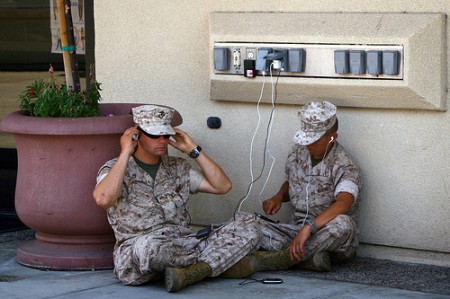
This week, the biggest names in the mobile phone industry declared war on Apple Inc by forming an alliance to combat the iPhone’s dominance over the apps market. And on Tuesday Microsoft launched a counterattack on the handset with its new Windows Phone 7. The battle waged by rival companies against Apple’s growing monopoly in the world of consumer electronics has become a commonplace media fixture, with the metaphor of war a recurring theme in press coverage.
But outside of the public consumer sphere, Apple’s market has extended to the world of actual warfare. The iPod touch is now being issued to US military personnel due to its multitude of battlefield applications and cost-effectiveness. This single device can be programmed to process the multitude of data of modern warfare, including linking soldiers and drones via wireless internet networks, and as a navigation and translation tool. Apps have been created that allow soldiers to receive intelligence on their local area, translate Arabic, Kurdish and several Afghan languages, and make ballistics calculations.
Developed in the private sector and retailing at around $200, the unit is far cheaper than any bespoke military-developed technology would be, and it is easy to train soldiers already familiar with using similar consumer gadgets. Apple has found yet another dedicated fan base to add to its near fanatical following.
The iPod can also have a more straightforward battlefield application. Jonathon Pieslak’s book Sound Targets, released last year, addresses the role of music in the Iraq war and how troops use mp3 players to listen to heavy rap and metal music to motivate them to fight. Violent tracks helped one interviewee “become what I consider to be a monster,” while another used heavy metal to enter a “predator mindset.” In this context, the iPod becomes a portable psychological tool that assists troops to “become inhuman to do inhuman things.”
In Apple’s infamous 1984 commercial, which bears a strong resemblance to the George Orwell novel set in the same year, the company presented itself as combating conformity, with a young athlete taking a sledgehammer to the face of Big Brother – a thinly disguised attack on IBM’s then-dominance in the IT market. Yet no software gets onto Apple devices, which have become a gateway to the internet for many users, without the company’s express permission. Now Apple is doing business with the US military, and seems to be regaining its Orwellian relevance for entirely the opposite reasons.

